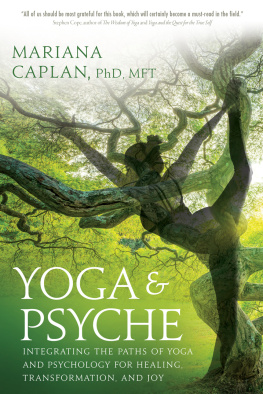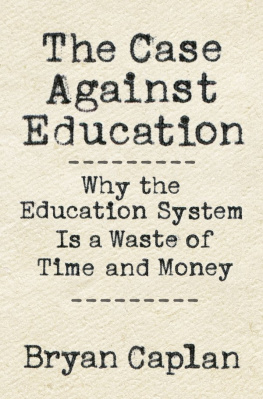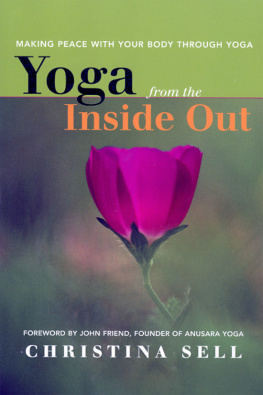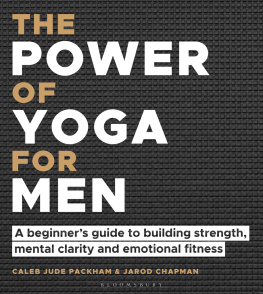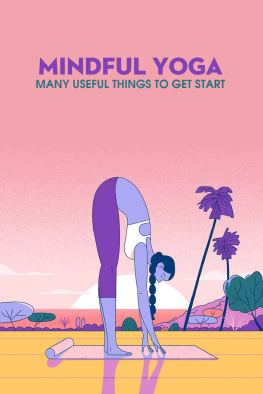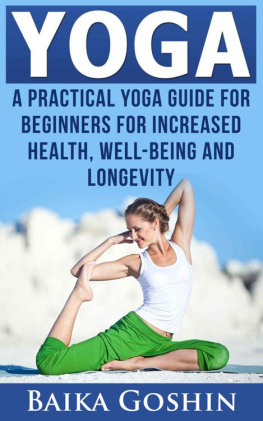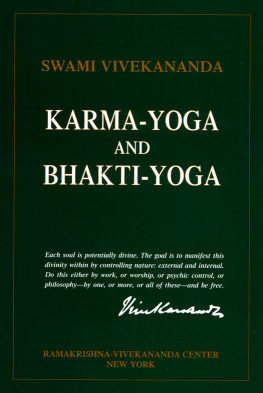ABOUT THE AUTHOR
M ariana Caplan, PhD, MFT, E-RYT 500, is a psychotherapist, yoga teacher, and the author of eight books in the fields of psychology, spirituality, and yoga that have been translated into more than a dozen languages, including Eyes Wide Open: Cultivating Discernment on the Spiritual Path, Halfway Up the Mountain: The Error of Premature Claims to Enlightenment, The Guru Question: The Perils and Rewards of Choosing a Spiritual Teacher, and To Touch Is to Live: The Need for Genuine Affection in an Impersonal World. She has been teaching workshops and trainings online, in yoga studios and universities, and at major retreat centers throughout the world since 1997. Mariana also developed innovative programs as a professor at the California Institute of Integral Studies, Naropa University, John F. Kennedy University, and Sophia University, and she is the founder of the Yoga & Psyche Method and the Yoga & Psyche Conference. Her articles have been featured in magazines and journals including Shambhala Sun, Tricycle, ReVision, and Journal of Transpersonal Psychology. She is a regular guest on television and web-based programs on subjects of spirituality, psychology, yoga, and wellness. Marianas personal essays have received critical acclaim, including the satire Zen Boyfriends, which was transformed into a musical, and Death Dont Have No Mercy: A Memoir of My Mothers Death, which was featured in Best Buddhist Writings of 2006. She lives in the San Francisco Bay Area and loves to travel around the world with her young son, Zion. For more information on her services and writings, read her Huffington Post blog or go to realspirituality.com or yogaandpsyche.com.
ACKNOWLEDGMENTS
I want to acknowledge my deep gratitude to my spiritual teacher, Lee Lozowick, and his guru, Yogi Ramsuratkumar. Both of these masters were powerful transmitters of tantric yoga whose kindness and wisdom continue to inspire me today. I also want to thank Arnaud Desjardins, the late Advaita Vedanta master, and the Sufi master Llewellyn Vaughan-Lee, whose teachings and presence have impacted me profoundly.
My hatha yoga training was most strongly influenced by Bhavani Maki, who is the founder of Yoga Hanalei in Kauai. Many other yoga teachers in the field who have become cherished friends and colleagues have deeply influenced me and taught me through our exchange, including Nubia Teixeira, Janice Gates, Sally Kempton, and Anne Cushman.
As a graduate student at the California Institute of Integral Studies (and later as a professor), I encountered a number of psychological visionaries who helped me along the way. Peter Levines Somatic Experiencing training (which I completed in 2006) has proven invaluableIve used it extensively in my Yoga & Psyche trainings, my private psychotherapy practice, my personal practice, and now this book.
Through the International Yoga & Psyche Conference in 2014, I met a number of important influences in my life. I have been deeply touched by Angela Farmer, Rama Jyoti Vernon, Eleanor Criswell, and Yogi Amrit Desai, among others. I have also learned a great deal from my clients, graduate students, the participants in my programs, and those who have entrusted me to their care at different levels as I continue to develop this body of work. I also want to acknowledge a neuroscientist, yoga teacher, and rock-star friend, Gabriel Axel, with whom I subsequently coedited the volume Proceedings of the Yoga & Psyche Conference (2014). Gabriel also coauthored the Yoga, Science, and the Brain chapter in this book, and his knowledge adds a crucial dimension to this inquiry.
Various teachers of diverse paths have blessed and supported me over the years. These include the late Georg Feuerstein, John Welwood, Claudio Naranjo, and A. H. Almaas (Hameed Ali). I also want to thank Holly Adler, Kim Burris, Dhyana Justl, Raia Kogan, Adriana Portillo, Haley Roth, Lynsie Seely, Kristine Tom, and Lauren Weiss for their friendship and assistance with the research presented here. Additionally, this work would not be possible without Jorge Ferrer, Hannah Gottsegen, Suraya Keating, Anastasi Mavrides, Karen Motan, Simone Thurston, Vipassana Esbjorn-Hargens, Marianne Costa, and so many other wise, dear, and brilliant friends.
Tami Simon found me years ago when I was living on my teachers ashram and asked me to write books for Sounds True. The whole crew has supported me impeccably through my publishing journey. My editors are brilliant, and the company is an expression of deep spiritual integrity.
My father, Herb Caplan, brought me into the world and has showered me with his pride and generosity throughout the years. When I was a young child, my mother (Mollie Caplan, who died a number of years ago) wrote in her diary that I would one day become an author, and I want to thank her for planting that seed in me.
I invoke the blessings of each of these individuals as I birth this book into the world, and I thank each of them for their unique gift and contribution to my life. May I accurately represent their teachings and transmissions in my own work integrating the fields of yoga and psychology.
ALSO BY MARIANA CAPLAN, PHD, MFT
Eyes Wide Open: Cultivating Discernment on the Spiritual Path
Halfway Up the Mountain: The Error of Premature Claims to Enlightenment
The Guru Question: The Perils and Rewards of Choosing a Spiritual Teacher
To Touch Is to Live: The Need for Genuine Affection in an Impersonal World
Proceedings of the Yoga & Psyche Conference (2014) coauthored with Gabriel Axel
The Way of Failure: Winning Through Losing
When Sons and Daughters Choose Alternate Lifestyles
REFERENCES
BOOKS
American Psychiatric Association, ed. Diagnostic and Statistical Manual of Mental Disorders, Fifth Edition. Washington, DC: American Psychiatric Association Publishing, 2013.
Amthor, Frank. Neuroscience for Dummies. Hoboken, NJ: John Wiley & Sons, 2012.
Bainbridge Cohen, Bonnie. Sensing, Feeling, and Action: The Experiential Anatomy of Body-Mind Centering, Third Edition. Northampton, MA: Contact Edition, 2012.
Boon, Suzette, Kathy Steele, and Onno Van Der Hart. Coping with Trauma-Related Dissociation: Skills Training for Patients and Their Therapists. New York: W.W. Norton, 2011.
Bowen, Bill. Somatic Resourcing: Psychotherapy Through the Body. Portland, OR: PPT, 2009. Ebook.
Bryant, Edwin. The Yoga Stras of Patajali. New York, NY: North Point Press, 2009.
Caplan, Mariana. Eyes Wide Open: Cultivating Discernment on the Spiritual Path. Boulder, CO: Sounds True, 2009.
_______. Halfway Up the Mountain: The Error of Premature Claims to Enlightenment. Chino Valley, AZ: Hohm Press, 1999.
_______. The Guru Question: The Perils and Rewards of Choosing a Spiritual Teacher. Boulder, CO: Sounds True, 2010.
_______. To Touch Is to Live: The Need for Genuine Affection in an Increasingly Impersonal World. Prescott, AZ: Hohm Press, 2002.
_______. When Sons and Daughters Choose Alternative Lifestyles. Prescott, AZ: Hohm Press, 1997.
Caplan, Mariana, and Gabriel Axel, eds. Proceedings of the Yoga & Psyche Conference (2014). Cambridge, UK: Cambridge Scholars, 2015.
Cope, Stephen. Yoga and the Quest for the True Self. New York: Bantam, 1999.
Cope, Stephen, ed. Will Yoga & Meditation Really Change My Life?: Personal Stories from Americas Leading Teachers. North Adams, MA: Storey, 2003.
Corrigall, Jenny, Helen Payne, and Heward Wilkinson, eds. About a Body: Working with the Embodied Mind in Psychotherapy. London: Routledge, 2006.
Coward, Harold. Yoga and Psychology: Language, Memory, and Mysticism. Albany, NY: State University of New York Press, 2002.
Next page
